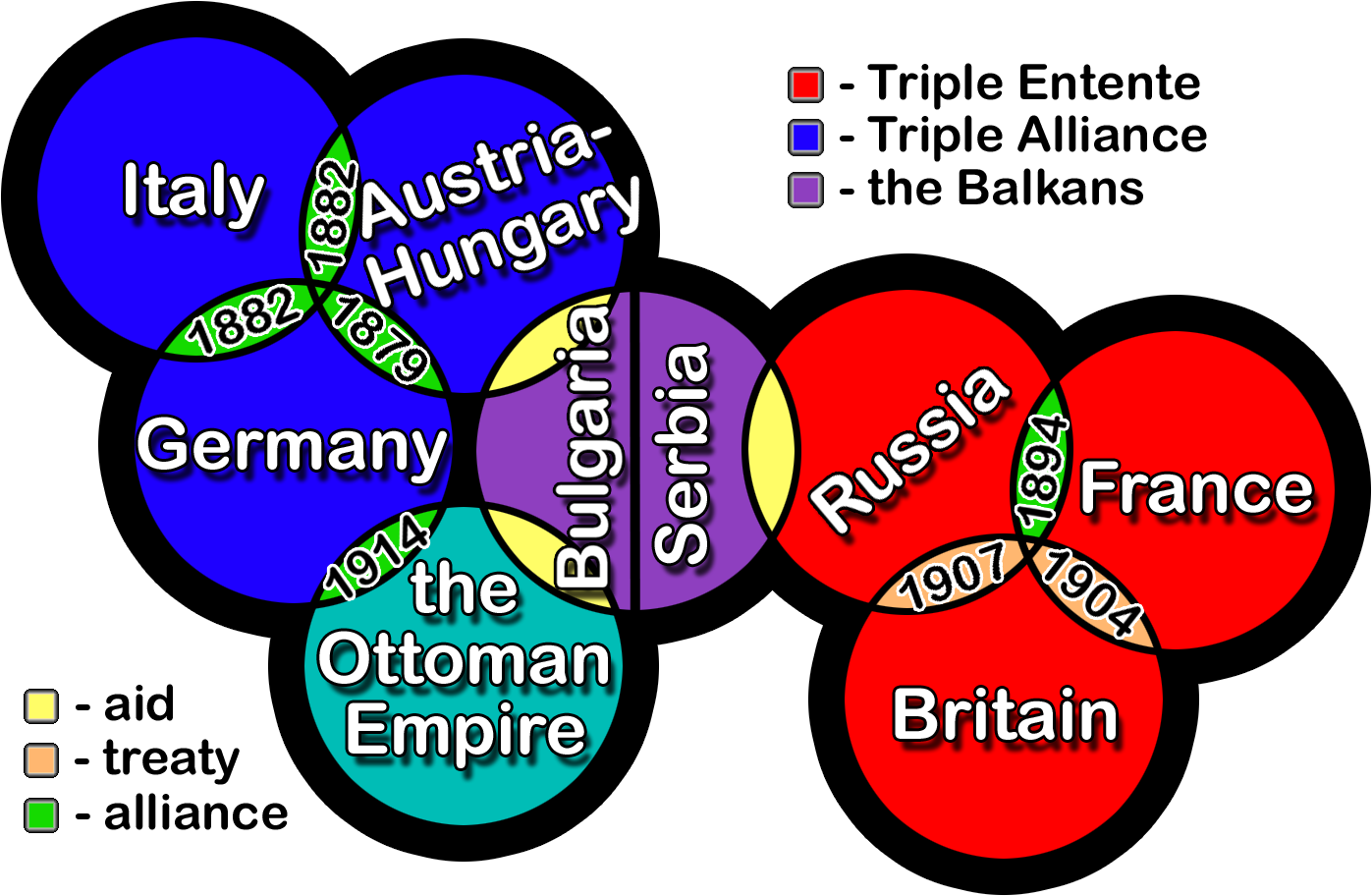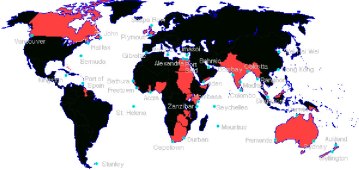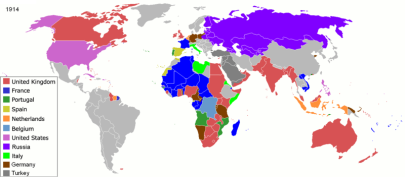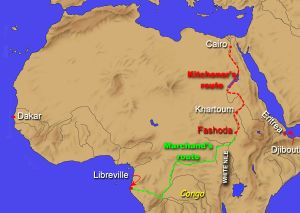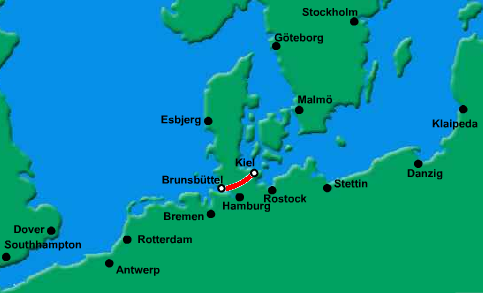Global Economies from 1801 to 2040
Look out for the Great European powers (Britain, France, Germany, Russia, Austria-Hungary and Italy) between 1801 and 1914. Can you develop a reason why there were rivalries?
European Geography
Why does Europe go to war so often?
Tim Marshall’s Prisoners of Geography is an excellent book to help you understand world history and contemporary politics. It is one of the books recommended for this course. How does the following map help you understand why Europe goes to war?
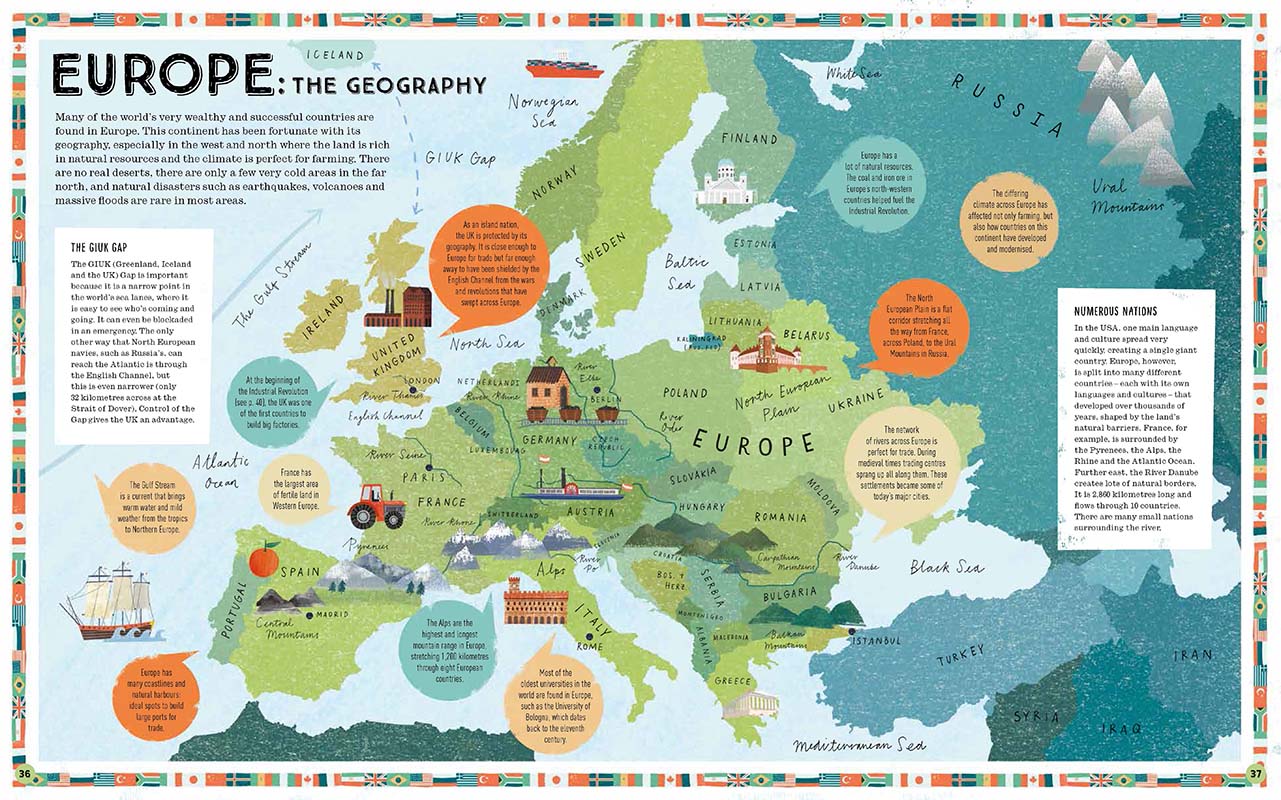
Before researching Europe before 1914, look at the following countries and work out the answers to the questions below.

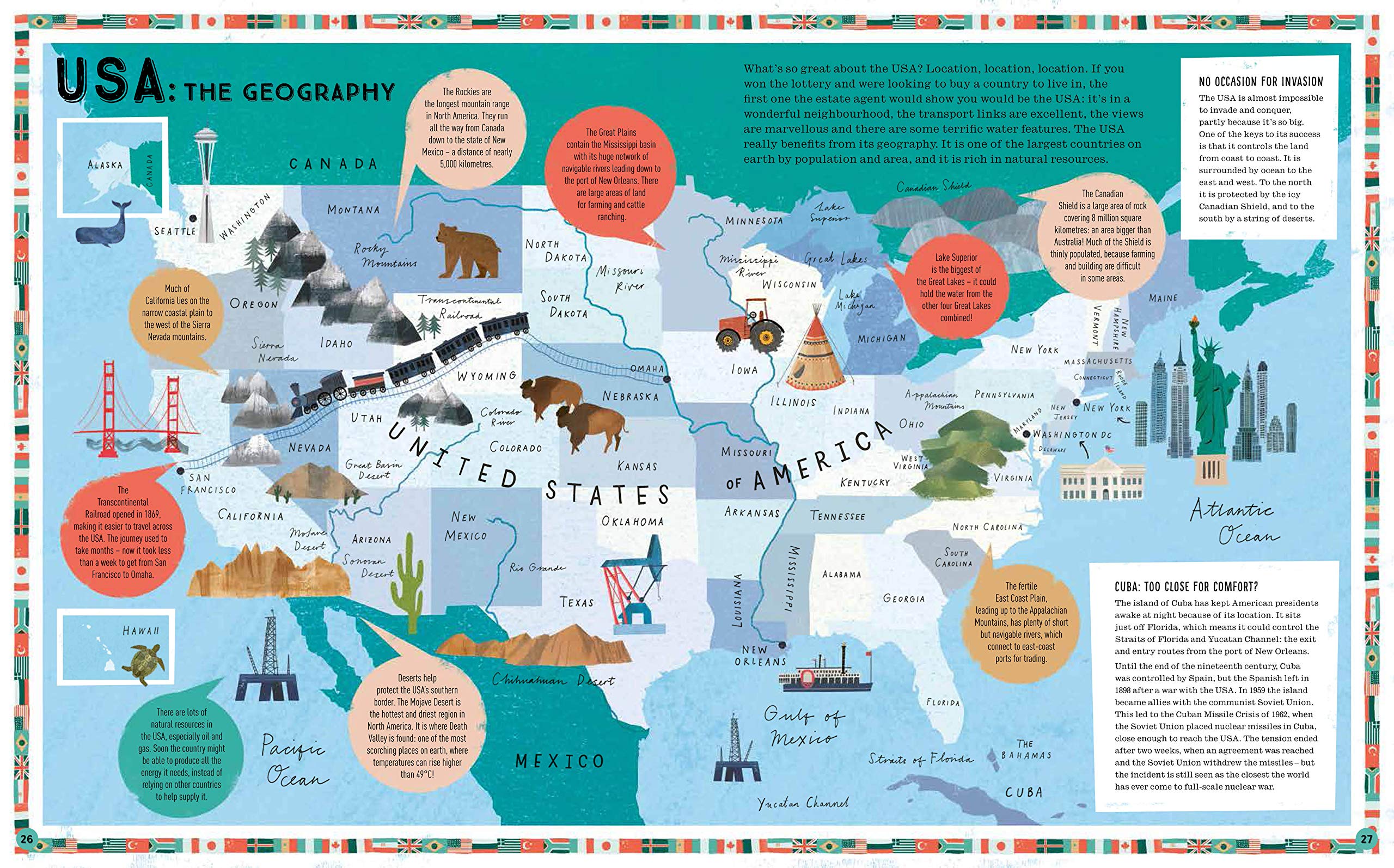

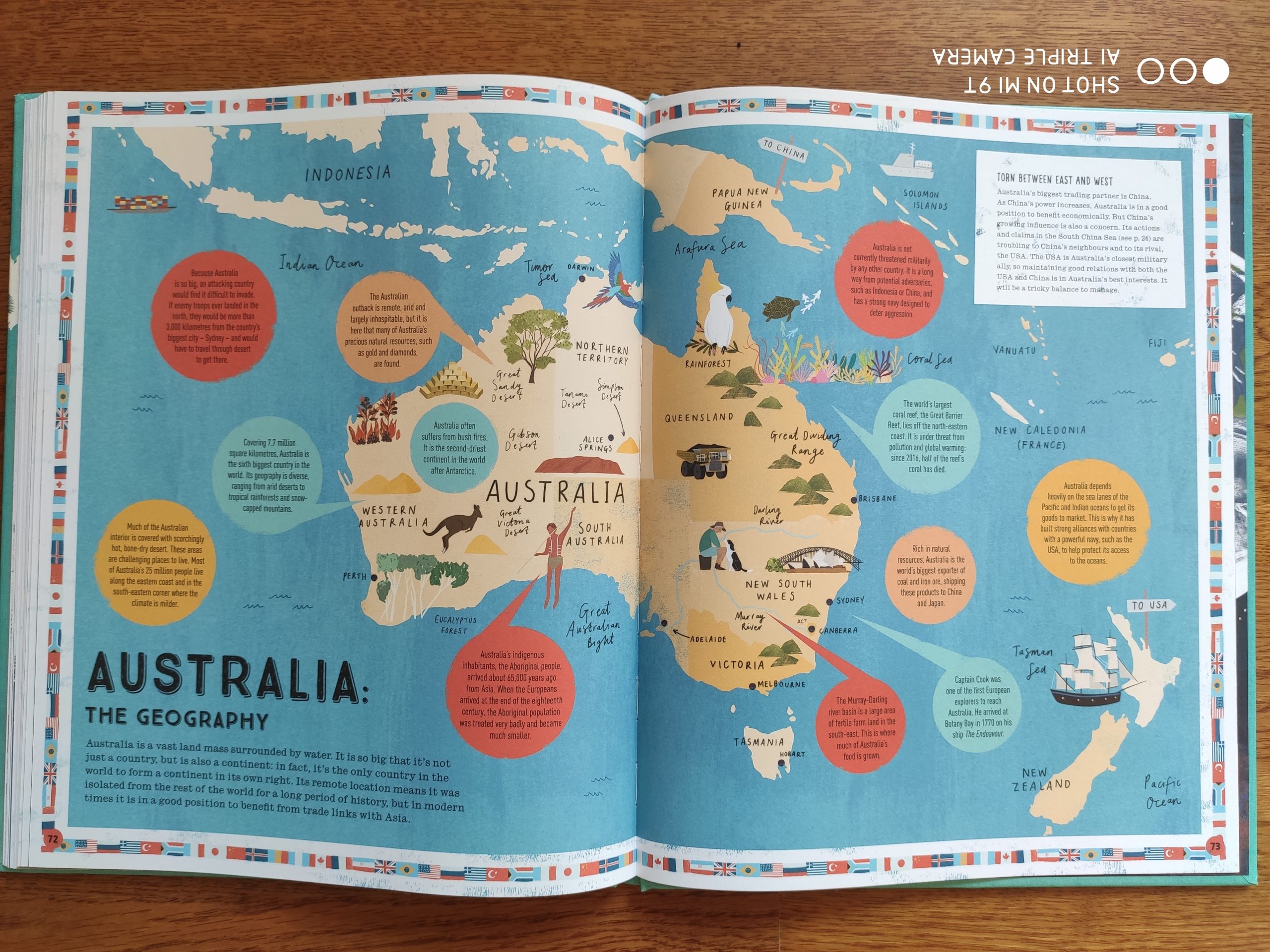
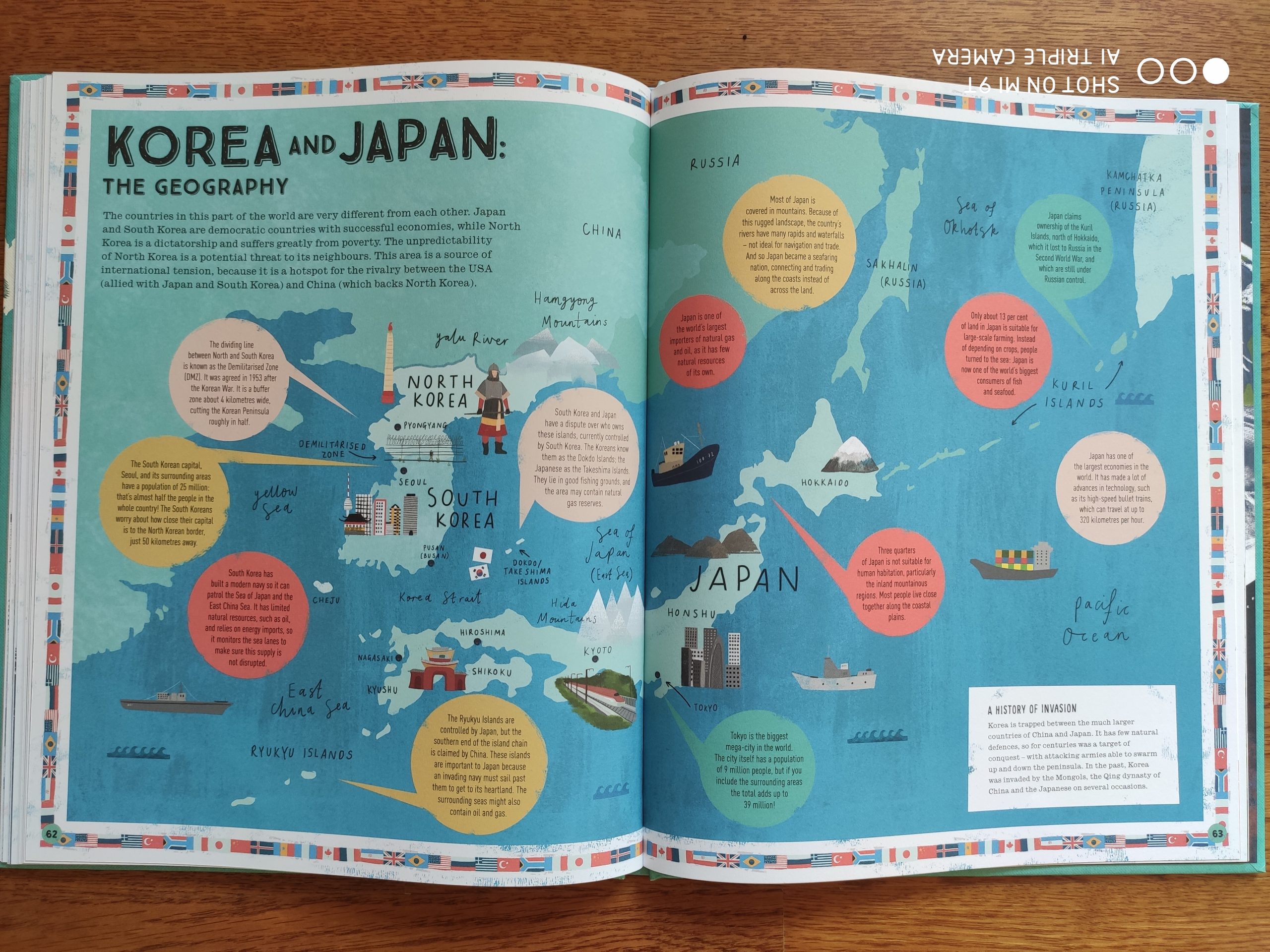
For each country/continent, work out,
- What are the aims of each individual country?
- What are the geographical restrictions for the country?
- What are the geographical advantages of each country?
- Where is each country’s sphere of influence?
- Who are their geographical rivals and why?
General Resources
Causes of World War I and the Rise of Germany – Thought.com
Alliance Systems
An explanation of all the alliances pre-1914
- Dual Alliance 1879 –
- Triple Alliance 1882 –
- Three Emperor’s League 1873-78 – To maintain the European peace and keep France isolated Chancellor Bismarck organised an alliance between Austria-Hungary, Russia and Germany. It expired in 1884 as the three countries were unwilling to renew it. There had been tension between them over the Russo-Turkish War (1877) and the consequent Congress of Vienna (1878).
- Dual (Franco-Russia) Alliance 1894 –
- Anglo-Japanese Alliance 1902 – Britain required an ally in the Far East to restrict Russian expansion. Japan was alarmed at Russian expansion into Manchuria and feared Korea could become a possible Russian target. Talks began in 1901 although Japan was also holding discussions with Russia just in case they could not reach an agreement with the British. On 30th January 1902, the London talks became a success. A military alliance was signed which would run for five years. If one power was attacked, the other would be neutral. If two attacked it, the other would go to war in support.
- Germany was happy with the treaty as it was a buffer against a possible threat, Russia. France was displeased as Russia was an ally. However, Delcasse saw that Britain had abandoned splendid isolation. This gave hope that he could proceed with an alliance with her.
- Anglo-French alliance, (Entente Cordiale) – As a result of Britain and Germany arguing and eventually abandoning attempts at an alliance, the former began to improve relations with France. Essentially Britain wanted to solve differences regarding their empire, especially Egypt. France wanted to exert more control over Morocco so a mutual understanding would be of benefit to both.
- Anglo-Russian Entente – Count Cassini, the Russian representative at Algeciras, was impressed with Nicholson at the conference. The spectacle that was the British fleet off Gibraltar was also impressive. The Russians began to see an alliance with Britain as a viable option. If had previously been in conflict over Turkey and years earlier in the Crimean War. Furthermore, the British Royal Family was dismissive of the Romanovs, and the signing of the Anglo-Japanese alliance was unpopular with Russia. The government admired Germany for its strength and order, the British with their democracy and the liberal outlook was considered ‘weak’ and a threat to their own internal power. Russia actually preferred an alliance with Germany as a result, despite an alliance with France already.
- King Edward pushed for an Anglo-Russian alliance. This despite the sinking by accident of British trawlers in 1905, thinking they were Japanese warships. Compensation was asked for and received in the figure of £65000. The Russo-Japanese War triggered the 1905 Russian Revolution. Events moved quickly afterwards as Russia was in a weak position. Sir Edward Grey, the new Foreign Secretary, encouraged further discussions with the Russians. These took place largely at the Algeciras Conference. Grey and others saw advantages in an alliance. They could have a freer hand in Afghanistan and its gateway to India, (the Khyber Pass), would be secure. Furthermore, an alliance would secure British influence in the Persian Gulf and the buffer of Tibet. Russia gained control over Northern Iran, (Iran was split into 3 as part of the alliance), and the threat from Germany was reduced.
- German reactions to negotiations made them slow. Throughout 1906 they took place but the alliance was not signed until 1907. Both sides were patient. Access through the Dardanelles was offered by Britain and influence over Afghanistan offered by the Russians for example. Bulow was asked by the Russians what he thought of the possible alliance and stated that Germany was indifferent. Therefore, it was signed in August 1907. It is worth noting that the alliance was similar to that of the French. There was not mention of war, aggression or defence, inferring that it was not a military alliance.
- Triple Alliance 1907 –

Congress of Berlin
This was a diplomatic meeting between the Great Powers of Europe in 1878. It was organised to solve the problems of the Balkans and the Ottoman Empire’s declining influence in the region. Russia had defeated the Ottomans in the war of 1877-78 and this resulted in the Treaty of St Stefano being signed. This recreated Bulgaria and gave support to Bosnia-Herzegovina, Serbia and Rumania. Britain was concerned that Bulgaria was to be a Russian satellite and Austro-Hungary too because of the rise of Slav nationalism. Consequently, this was an area of concern for the Great Powers and a Treaty of Berlin was planned…
- Dominated by Chancellor Bismarck
- It maintained the Ottoman Empire as a European power.
- Austro-Hungary was allowed to influence Bosnia-Herzegovina
- Russia was humiliated as it had to give away some of the spoils it gained in Stefano.
- The problems of the Balkans were not solved, they would surface again in the twentieth century.
Kruger Telegram
- The Jameson Raid of 1895 led to the Kruger Telegram. Cecil Rhodes and Dr Jameson contrived to take over the Orange Free State because of the gold deposits there. They used the excuse of Paul Kruger’s laws against foreigners to do so, however, (not without some validity it has to be said).
- The Kaiser decided to write a telegram to Paul Kruger outlining his support for his ‘independent nation’ and congratulations for his successful defence. This led to growing anger amongst that British press, parliament, the royal family and the public. Germany became more of a hate figure than the French with the British public. The German press and public responded in kind. Admiral Tirpitz said later that this event helped him in the long term gain funds for the German navy. Holstein, writing in 1907, explained that Anglo-German rivalry began with the Kruger Telegram.
- Perhaps the Kaiser reacted this was because he had been angry with Britain, especially Lord Salisbury because he had been one hour late to a meeting six months earlier. He also did not turn up to another, citing a meeting with the Queen instead. The Kaiser criticised the British for his loss of face although Salisbury pointed out in private that he worked for the Queen, not Wilhelm.
Boxer Rebellion
- The Boxers began to rebel in 1900. Westerners and Chinese Christians were killed. Diplomats and over 400 sailors/ soldiers were besieged for 55 days in Peking. Eventually, soldiers from various countries, 25 000 in all, set off to raise the siege. They were successful, with British and Japanese soldiers entering Peking first. However, the Kaiser had previously given the order that a German force be sent to China to save the besieged force. He, and Germany as a whole, would be the saviours. Unfortunately for Germany, the siege was lifted before their force arrived. Once arriving, however, the German soldiers began raping and looting. They were told by the Kaiser before they left that they were to take revenge for the death of the German ambassador and make the Chinese fear the Germans for a thousand years. The Germans also made the Chinese pay reparations of £67,500,000; an amount the Americans said was too much. Incidentally, the Kaiser was none too pleased when the Boxers used Krupp artillery to make seventeen holes in one of his ships. He made a point of informing Fritz Krupp.
The Daily Telegraph Interview
- The Kaiser was asked for an interview and duly gave one. However, before being published, the transcript was sent to Bulow to look at. Unfortunately, this was not done, more as an oversight rather than as an act of idleness or political expedience. Quotes from the interview range from, ‘The English are mad…not to take the friendship of Germany, he took it as a personal insult that the English were not so forthcoming, he had ignored the request from Russia and France to attack England when they were at their weakest during the Boer War, (he also said that Germany would act to prevent any attack), and that Germany had a plan to invade Britain just in case it had to protect its own shipping, (there was no threat intended by the Kaiser, merely honesty on his part – the British would probably have their own plan although would never make it public knowledge). The British people took quotes out of context and confirmed their belief that Germany was a belligerent nation.
- Bulow took a great deal of responsibility for the debacle although tried to pass the buck to others, as was the norm for him. International reactions were of surprise. Russia and France denied their request of Germany, and Japan was eager to find out how its own navy would be affected by that of Germany. Ultimately, the big loser was Bulow. He threatened to resign, thinking yet again that it would be rejected. This time, the Kaiser accepted. A further consequence was the deterioration of Anglo-German relations, yet again.
Imperialism
How is the power of a country measured? Wealth, reputation, size of economy, military might? All can be used but in 1900 it was the size of your empire. How much of the world did a country govern? The Europeans had been building their empires since the 16th century, in all the world’s continents. By 1900 the largest was the British Empire, covering a quarter of the planet’s landmass. They were first to experience the Industrial Revolution so had an advantage over other countries.
To maintain control over its colonies it had to have a large and powerful navy. If there were problems in South Africa, India or New Zealand, the British would have to transport soldiers and supplies there to solve them. If any other European country had, or wanted to build, a large navy, Britain would become a rival or possible enemy.
Imperialism is the government policy to gain and maintain an empire. Most of Europe’s governments, and the USA, sought to establish a bigger and better empire in the 19th and early 20th centuries. The following map shows you the extent to which the Europeans dominated the world during this time.
How can imperialism lead to war? The answer is relatively simple: competition. Countries would argue over land that they wanted for their own empire. For example, France and Britain were rivals over Egypt, Germany and France were rivals over Morocco. They might not have gone to war over these lands but they would make the relationship between countries worse.
- Imperialism may make your country build up your armed forces so you can gain more or protect your empire.
- It may make you compete with another powerful country. This may make you sign agreements or produce alliances that make the situation worse.
- Imperialism does not mean that you have to build an empire by taking over countries in faraway lands. At the beginning of the 20th century, the Austro-Hungarian Empire wanted to gain more land in Europe. It wanted lands in the Balkans to maintain its power.
- Although Europe dominated the world at the beginning of the 20th century, countries such as the USA and Japan also sought to establish an empire.
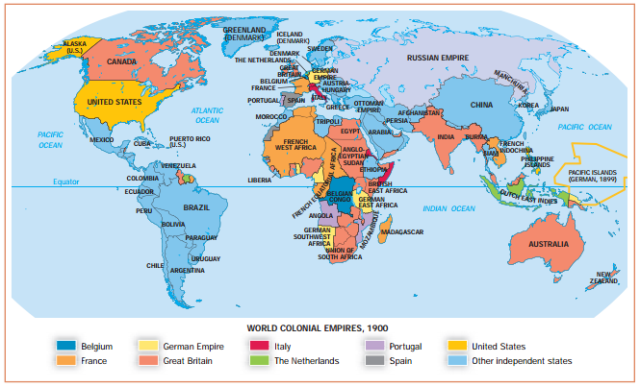
Example 1 – Fashoda
The land south of Egypt was barren; there was little there. France decided it would try and settle there, perhaps even start a colony, so that their empire in Africa would stretch from the west to the east coast. The British thought this would be a danger to their colony, Egypt. It therefore threatened to use force to remove the French. War was possible. However, the French government decided that they were not strong enough to defeat the British so pulled away from the area.
Example 2 – Morocco

Germany did not have a large empire in 1900 and wanted to increase the size of it. Morocco was one of their targets; the problem was that it was also France’s. There was a possibility of war in both 1906 and 1911 but on both occasions the German government and Kaiser decided it was better for them if they did not fight. This humiliated Germany and the Kaiser and they promised not to be in the same position again.
- Morocco had internal problems (such as the kidnapping of two US citizens) and the Sultan wanted help from a foreign power as a result.
- Three European powers had an interest in the country; France (border to Algeria and other colonies in North Africa), Britain (Gibraltar, a key naval base, only a few miles away) and Spain (geographical interest). To avoid problems over Morocco, the Treaty of Madrid was signed in 1880, (if one power overturned the agreement and seized political and economic power in Morocco, the other signatories had, at least, to be consulted). Germany had no interest in the country at this time.
- The Sultan was a good friend of the British but, as they were busy with the Boer War, preferred France to help out. However, the Sultan feared that they would take away his power, ruling themselves, so turned to the Germans instead. Chancellor Bulow and a senior member of Foreign Ministry Holstein now became interested in the country as it may allow the new Entente Cordiale to break up or at least weakened.
- Bulow advocated an ‘Open-Door‘ policy whereby any European could ‘improve’ less developed countries. This would include Morocco and may prevent any major country from taking it as a colony. The aim was to cause disruption in the French government and force the resignation of their foreign minister, Delcassé (he was a key player in establishing European alliances in opposition to the Triple Alliance). Force could be threatened as they knew France could not fight them in a war.
- The Kaiser visited Tangiers in April 1905, the idea of both Holstein and Bulow. The French used diplomacy in response, even welcoming the Kaiser to the city.
- The British saw the move as dangerous as it may weaken the new alliance with the French and, perhaps more importantly, lead to a German naval base in Morocco…a potential threat to their Mediterranean fleet.
- Delcassé thought that German aggression was a bluff (he was correct) but media and public attitudes towards Germany became hostile. Bulow suggested that all eleven European powers and the USA meet to discuss the future of Morocco but France refused. A French Cabinet meeting took place and Delcasse became the scapegoat for the crisis, he promptly resigned.
- Bulow and Holstein were content with Delcasse’s downfall but according to Robert Massie, they wanted more. They insisted that there be an international conference over the issue of Morocco, a surprise to the French as they had fulfilled their objective of removing their Foreign Minister.
- Lord Fisher (in charge of the British Royal Navy) also argued that Germany was now the major threat to his country. Furthermore, the British government was dismayed with the resignation so decided to show support to the French. The Royal Navy was received at Brest and the favour returned when the French navy visited Portsmouth. King Edward tried to make the visit a success, with a desire to improve relations and possibly antagonise the Germans.
- On 28th September, France and Germany agreed to the conference in Algeciras, which would take place in January 1906. The German representative was Tattenbach, an aggressive diplomat. His mission was to reduce French influence over Morocco. Nicholson was the British representative. Germany asked for the Moroccan police to be internationalised, the French wanted to control themselves.
- On 1st March, twenty British battleships, dozens of cruisers and destroyers, arrived at Gibraltar, all of which could be seen from Algeciras. A show of strength was obvious to all present. Admiral Beresford invited all delegates on board his flagship, (King Edward VII), possibly to allow all to see the fleet assembled.
- Holstein sought war to solve the problems although Bulow did not. Nicholson was exasperated at the weakness of the French at the conference in response to this threat. The Germans failed to get sufficient votes for their demands and consequently wanted an end to it as it was dragging on.
- The results were that, (it ended 7th April), France should have special responsibilities over the Morocco/ Algeria border, and France and Spain share control of the police (although there would be a Swiss commander). Initially, it was thought that Germany had succeeded at the conference, as it had reduced France’s influence over Morocco. However, it became clear that the German plan to weaken the French/ British alliance by further weakening France had failed. The entire episode had strengthened the alliance. Furthermore, when this was realised, the Reichstag wanted a scapegoat. Bulow engineered that it was to be Holstein, not him!
Morocco 1911-12
- Despite the agreement of 1906, tensions continued over Morocco. German companies established subsidiaries in the south of the country and the government felt that the area was generally fertile. They felt that the French were not allowing sufficient influence for Germany. Britain was content for things to continue as they had more trade with Morocco than either. France did not allow Germany to exert influence in the south of Morocco as it was not part of the Algeciras Agreement. However, the Germans wanted to change this.
- Morocco had changed since the Sultan Abdul-Aziz of 1905. He had been replaced in a coup by his brother and there was growing resentment of the French in the country. A French policeman was murdered in 1911 for example. The French government argued that Europeans in the town of Fez were under threat so informed the other Great Powers that it sending a military column to help. Germany partially agreed although its own intelligence did not see Fez as a dangerous place. They issued a private warning that the military presence should not become a permanent one as they were worried that French actions were just an excuse to exert control over the area.
- The drama escalated because the French knew that Germany was entitled to be consulted over Southern Morocco. Compensation should even be paid should France take control of lands in the area, (although none was suggested). Robert Massie argues that if events were to be continued at a diplomatic pace, compromises would be reached. However, German policy was to be the stronger ‘partner‘ and not wait around for another country to act. Therefore, if the French policy was to send the military to help its countrymen in Fez, why not allow the German military to help ‘its countrymen’ in the south of the country, (it is arguable whether Germans were there or were actually under threat).
- The Kaiser was against sending a ship to Morocco as this may antagonise Britain, and obviously France. However, Bethmann-Hollweg, (the new Chancellor, and Kiderlen, the new Foreign Secretary), persuaded him otherwise. The Panther was sent, albeit a small gunboat, and the cruiser Berlin arrived a few days later. The move caused alarm in Europe. France for obvious reasons, Britain because it feared Germany may build a naval base on the coast, thus threatening British shipping, and Russia, because it threatened its ally, and it did not want to get involved in a European War because of Morocco. However, the Admiralty decided that a naval port would lead to more problems for Germany than actual benefits, such was the distance. Consequently, a move to split the Entente, just as in 1905, became of more importance to the British.
- The French knew that they could not allow Germany to be ceded land in Morocco. The people would not allow it and French honour and status would be knocked once again. They felt that Germany may be given land in the Congo instead and this became their policy.
- Britain asked for clarification of Germany’s demands but had to wait 17 days for an answer. This, and the actual gunboat diplomacy, led Lloyd George, (who previously was against conflict and a ‘Germanophile’), to deliver a speech against Germany, albeit not mentioning her by name. The German reaction was hostile, arguing that Britain was involved in something which did not affect her, again. Tensions escalated as the British and German diplomats and ministers could not agree. Fleets were put on alert and war was a distinct possibility.
- The German government established that a future war with France would involve Britain at her side. Was Morocco worth a European war? It decided that it wasn’t so tried to resolve the conflict. It first agreed not to interfere with any British interests and then tried to compromise with France. It asked for French Congo as compensation. This proved too much for the French to accept, especially as it felt Britain was behind her. It had renewed confidence when speaking with Germany. However, the Germans were not to be pushed around by France. It was a matter of honour and power within Europe. War was a possible threat once again. However, eventually, Kiderlen (head of the German Foreign Office) agreed to 100 000 miles of the French Congo territory and Morocco becoming a protectorate of France in all but name.
- France had won, Germany had lost. The event also worsened relations between London and Berlin. The Reichstag blamed Kiderlen and the German mood was close to humiliation. The talk was of using force next time. Kiderlen’s reputation never recovered from this and he died the following year.
Student Responses – What if Germany gained Morocco as a colony?

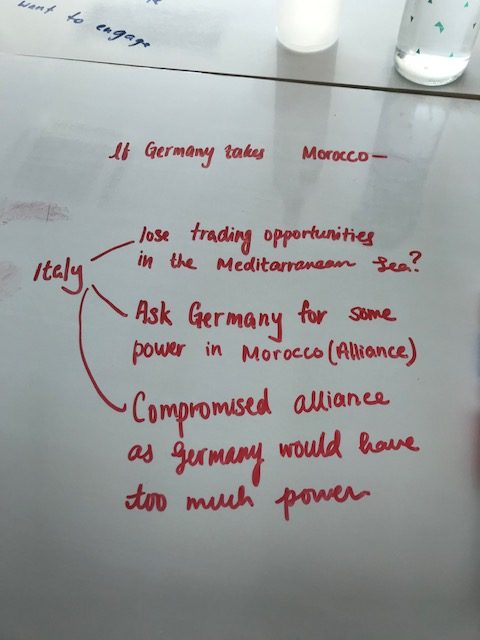
Bosnian Crisis

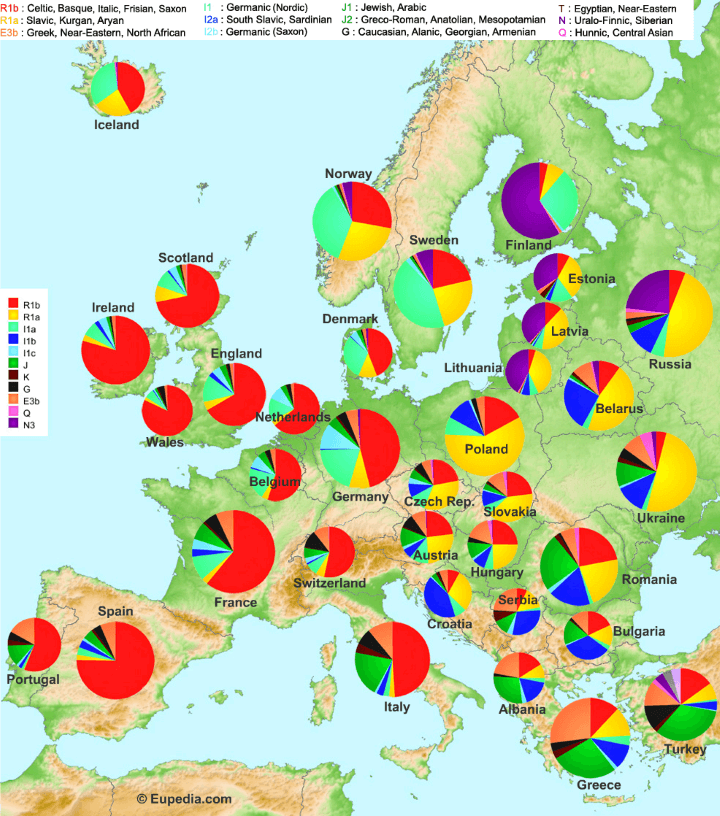
- As a result of Britain suggesting that Russia could have access to the Dardanelles, (even though it was not part of the Anglo-Russian Entente), it pursued this proposal. It needed access for its Black Sea fleet, a force which was unable to play a role in the Russo-Japanese War because of the barrier that was in place. Isvolsky, the Foreign Minister, who pushed for the alliance mentioned, decided to broach the subject with Austria rather than Britain. He knew the Austrian Foreign Minister, Count von Aehrenthal, well so pursued this avenue. The latter pushed for agreement over the Balkans as the Turkish government had recently fallen, (the Young Turks had recently taken over the country because its power had declined over recent decades). He knew that Austria had occupied and administered Bosnia and Herzegovina for thirty years, albeit with the façade that was Ottoman control. The fall of the government in Turkey made Austria think of annexation rather than an occupation. This despite one million Slavs living in the provinces, (many who wanted to unite with Serbia and her Russian ally had given its blessing for this).
- The plot was in violation of current European agreements. Russia risked conflict with her Entente partners and with its own people. Austria ran the risk of conflict with Germany if the problem/plot escalated. Isvolsky furthermore had not informed the Tsar nor the Prime Minister, Stolypin. No date was set as the ground had to be prepared so the Great Powers would not be too critical. However, Aehrenthal betrayed his counterpart and annexed Bosnia and Herzegovina before Isvolsky was ready. The plot was found out and Russia, which had gained nothing, turned against its Foreign Minister. Britain also turned against him and refused to recognise the annexations. Isvolsky asked Britain for help in opening the Dardanelles but this was received icily. He asked for a conference on the issue and Britain agreed. Austria would only agree if their policy over Bosnia and Herzegovina was accepted. Russia refused.
- Germany was forced to support Austria. It had publicly supported Austria for years and was therefore difficult not to do so during the Bosnian Crisis. Bulow backed Austria’s demand that there would be no conference without Russia’s acceptance of the annexations. As Serbia mobilised and Russia and Austria stationed troops on their borders, war seemed imminent. Germany then proposed issuing Austria-Hungary a free hand over the area unless Russia back down. This in effect meant if Austria-Hungary invaded Serbia, and Russia intervened, Germany would come to its aid. Russia backed down, knowing it could not take on Germany in war. Bulow took credit for solving the crisis and praised Russia for its conduct, (possibly to promote good relations between the two powers). Austria was indebted to Germany and Bulow for their help and thanked them gratefully. Britain, which saw Germany’s actions as aggressive, also saw Russia’s capitulation as a surprise. Nicholson explained that he thought he would never see the day when Russia would be dictated to by another European power. The consequences of the crisis were there for all to see. Germany’s strength, Russia’s weakness and therefore a desire by the Tsar and Russia to get revenge for their humiliation.
Naval Race
- Admiral von Tirpitz was a major factor in worsening relations with Great Britain. He and Wilhelm were advocates or a large fleet, the latter for prestige and possibly to guard an empire, especially after Bismarck was removed. He wanted cruisers to do this although Tirpitz wanted a large fleet of battleships as he saw this as the future. The Reichstag would not pass the budget requirements for either choice. However, when Tirpitz was appointed State Secretary of the Imperial Navy Office, he began to exert more influence over the Kaiser and the members of the Reichstag. He memorably changed the policy that if Britain ever attacked ‘Germany would need battleships’, to ‘we need battleships in case GB attacks.’ He moved foreign policy from the possibility of France and Russia becoming into conflict with Germany, to Great Britain. Britain responded by building more of her own ships as Germany’s plans were an obvious threat to her own power.
- Tirpitz knew that there was a chance of Britain attacking Germany before her fleet was ready. This was called the ‘danger period’. However, the more ships built in response to each other, the longer the danger period. He was able to convince the Reichstag several times to increase the naval budget because of events such as the Boer War and Morocco.
- Tirpitz pressed ahead increasing the size and quality of the German Navy. He responded to British developments but was restricted by the size of the Kiel Canal. Ships could not be built larger than 16 000 tonnes or so because the canal was too shallow and narrow. Tirpitz convinced others that a programme was needed to widen the canal. However, it would take time to complete, thus delaying the building of German dreadnoughts. This building programme, however, became important when began as it led to the 1909 Naval Scare.
- Sir John Fisher completely revolutionised the Royal Navy. He felt it was too outdated, inefficient and commanders were too set in their ways. Ships were mothballed or modified, crews were trained properly, tactics both changed and improved, ‘ineffective’ commanders removed and schools were set up for strategy and new weapons. This was done against much opposition from the navy hierarchy and politicians. However, he remained a close friend of King Edward which always guaranteed him support. He was a blunt speaker and did not have the etiquette of many other officers, (e.g. Beresford). Fisher saw that Germany was the new threat, (Royal Navy tactics were always mindful of France previously), just as Tirpitz saw Britain’s naval superiority as a counter to Germany’s growing power.
- Fisher’s decision to build the Dreadnought was a controversial one. In building this ship, other naval powers may do the same and the rest of the fleet would become obsolete. It cost a huge amount of money to build these ships, and it became a difficult exercise to convince parliament to pass the naval budgets. This was especially the case during the 1909 Naval Scare.
- 1909 Naval Scare – Generally there were arguments between the British and Germans over the number of ships being built. Britain claimed that Germany began building before the Reichstag had given permission to do so. This clouded the intelligence the British had about the size of the German navy. They expected fair play! It was proved that this was happening but Germany was not substantially increasing the size of its fleet, something the British parliament, people and press were increasingly anxious about. The Admiralty were pushing for even more ships as a result of German naval power. Parliament initially disagreed but relented eventually. Leaks to the press from the Admiralty did enough to establish the national feeling, one of fear and decisiveness on behalf of their politicians. The key consequence of this event was to worsen relations between the two powers, even if it was more the people rather than its politicians.
- Germany was entitled to build Dreadnoughts and their capacity to do so was what worried the British. She had always been the nation capable of building ships before anybody else. The ‘Krupp industries’ were endangering this capability. A further problem was that Britain repeatedly asked to see German shipyards and to reach a compromise on how many ships each country would build. Each time it was suggested that Britain build more, or make sure that it retained its naval power. The Kaiser amongst others bridled at these ‘orders’. This led to a German proposal whereby Britain remain neutral in Central European affairs (the issue of the German annexation of Alsace-Lorraine being one) if they agree to restrict the size of their navy. The British saw this as a free hand to extend German power. They would be unable to come to the aid of France or Russia. However, talks did progress and restrictions were to be agreed. Unfortunately, the arrival of the gunboat Panther in Morocco altered the importance of the issues.
How serious was the German naval threat to Great Britain before 1914?
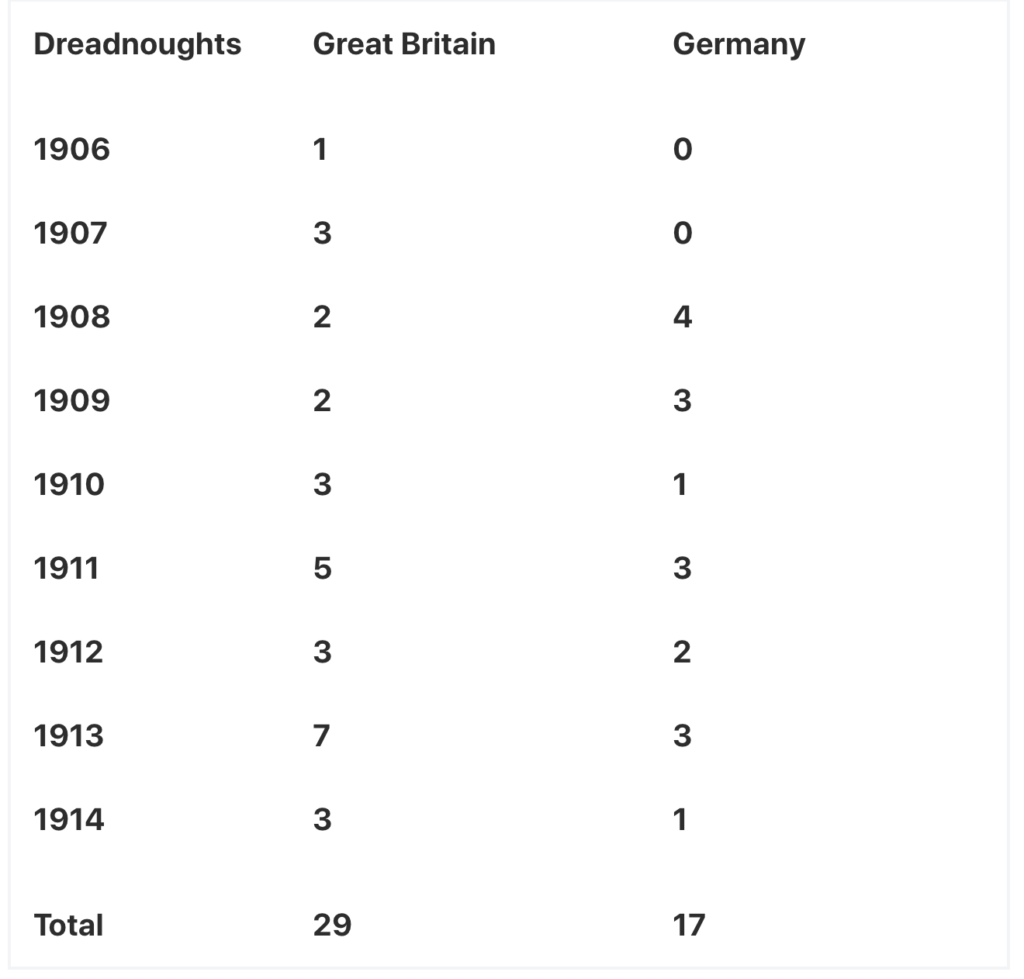
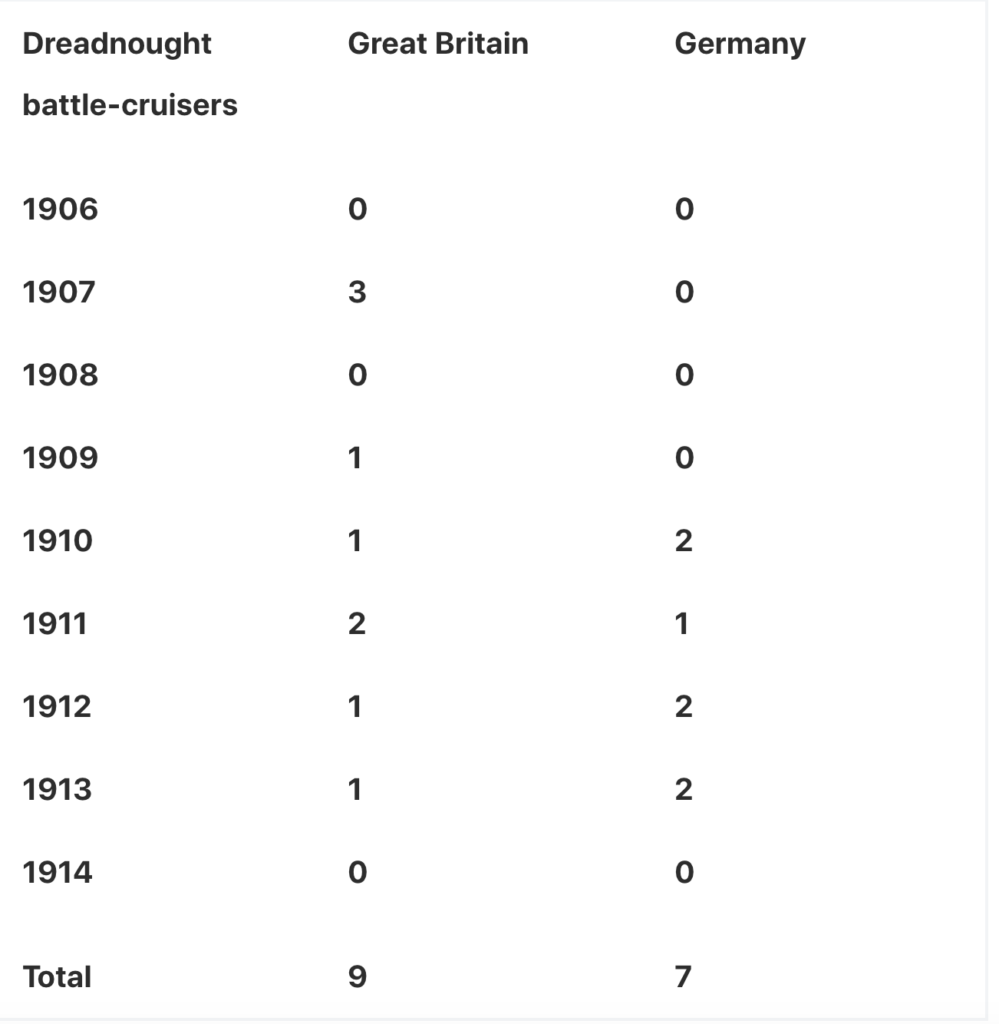
Balkan Wars
- The Ottoman Empire was crumbling; Cyprus in 1878, Tunisia in 1881, Egypt in 1882, Bosnia and Herzegovina in 1908 and Tripoli in 1911. Small Christian states such as Serbia, Montenegro, Greece and Bulgaria, once all members of the Empire, took actions to further their own ambitions as a result. In October 1912, they all attacked European Turkey. The Turks collapsed. The Bulgarians were at the gates of Constantinople and the Greek Army entered Salonika. Serbia also took the port of Durazzo on the Adriatic, giving access to the sea. The Turks begged for an armistice by December.
- There was an even bigger picture to all of this. Austria felt the Serbs would lose and threatened to attack them after their Turkish victory. Russia had given its blessing to the Balkan alliance so it may have to come to the aid of Serbia, although it was displeased that a Bulgarian Army was at the gates of Constantinople, (it always expected a Russian Army to do this). Germany had improving relations with Turkey as it had been building the Berlin-Baghdad railway, and it had Austria’s interests to consider. Britain suggested a conference to prevent further problems. This took place in London on December 10th, 1912.
- There was a temporary halt in fighting, but as the Turks and Bulgars would not agree to Adrianople being ceded to the latter, war resumed. A Bulgarian/ Serbian Army took Adrianople and the Turks sued for peace again. Austria demanded that the port of Durazzo be independent, rather than be held in Serbian hands. Under Russian pressure, they agreed. The Treaty of London was signed on May 30th. It gave Adrianople to Bulgaria and a new state of Albania was created out of Durazzo and surrounding areas. However, peace only lasted one month as Bulgaria attacked her former allies. She took Salonika and defeated the Serbs. At this moment, Romania attacked the rear of Bulgaria and threatened Sofia. The Turks took advantage of Bulgaria’s problems and regained Adrianople. The Kaiser backed his cousin, King Carol of Romania although the Tsar did not back Tsar Ferdinand of Bulgaria. The Third Balkan War was over and eventually the Treaty of Bucharest was signed. Bulgaria was stripped of most of her gains, Salonika returned to Greece and part of Bulgaria became Romanian.
- The Great Powers did not militarily intervene, (with the exception of Austria, who threatened Serbia). Meetings between the foreign diplomats actually led to improved relations. War was averted over the Balkans Wars and a possible war may also have been prevented.
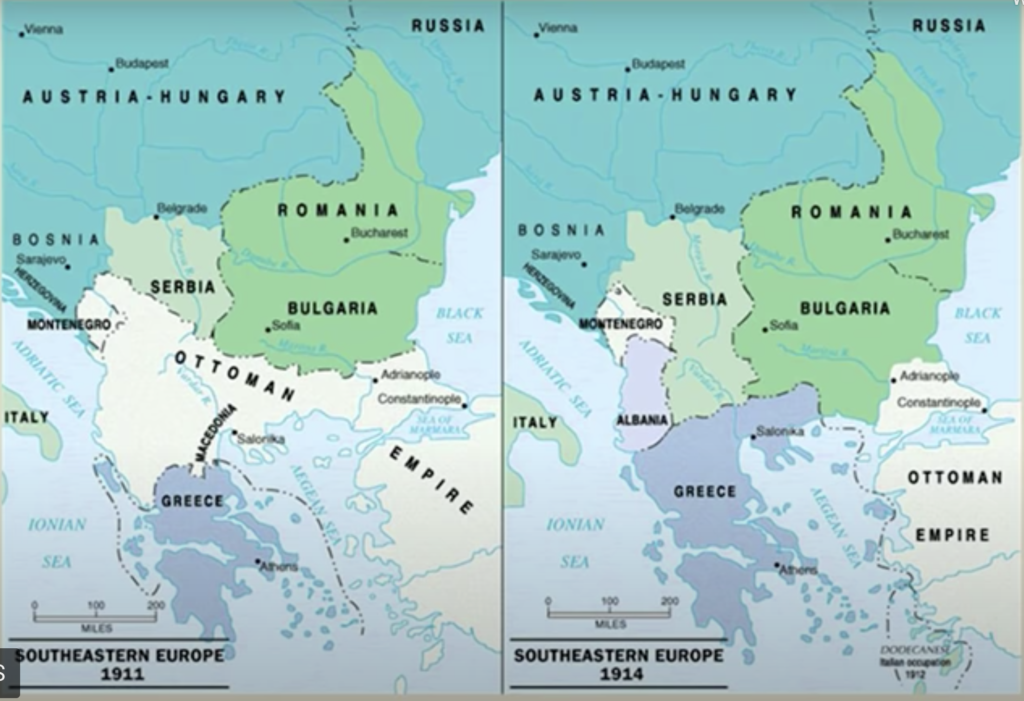
July Crisis
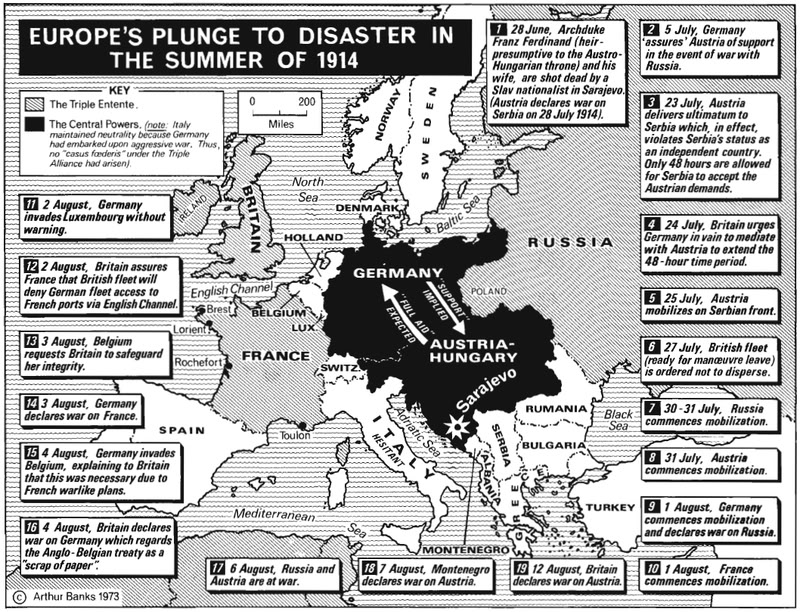
- Austria-Hungary’s power was declining. Part of the problem was the Slav influence in the country. However, they had little representation, as the Austrians and Hungarians dominated the seats of power. This made Serbia was a growing threat, as it wanted to unite all Slavs in the area. Russia was its backer, although Austria knew Germany, as her own, would deter her, (however, there was the feeling that Russia would not back down again as it had during the Bosnian Crisis of 1908).
- The assassination of Ferdinand gave Austria widespread sympathy. It was felt that no-one would object to retribution. For years, the Austrian military wanted to destroy Serbia to maintain Austro-Hungarian power. They only needed an excuse for a ‘preventative war’ to take place. Twice before, in the 1908 Bosnian Crisis and the Balkans Wars, they had mobilised but a war did not follow. If Germany backed Austria fully this time, a local war would begin.
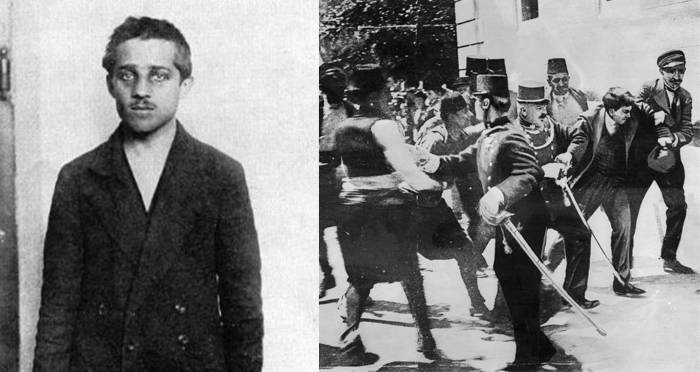
- A ‘Note’ was issued to Serbia listing many demands which Austria felt it could not meet. Any refusal would be grounds for war. The German leaders had given Austria a blank cheque (see links below) over Serbia and gave full support for a war to begin in July, (the decision was taken to support Austria-Hungary on June 5th). However, the Hungarian leader preferred to use the pretence of diplomacy first, hence the Note was drafted. Germany anticipated a war with Russia, and possibly France, but it felt they were too weak to succeed. Its leaders did not even discuss a war with Britain, as it did not feel it would be party to a European War. However, the German leaders felt that they had to support Austria as they were their only ally in Central Europe. With the defeat of Austria, Russia may be on her eastern border. It would be more difficult to defeat two European nations by herself. Italy did become part of the Triple Alliance but she could not be relied upon such was her current strength.
- The Note was issued to coincide with the French premier leaving an official visit of Russia. The Great Powers suggested conferences and other attempts to mediate but they did not know of German intentions to support Austria regardless. Even Italy was kept in the dark. The Kaiser and other leaders left Berlin on holidays and visits, so to alleviate any concerns of other powers that war was being planned. William went to Norway for 3 weeks. On his return he saw that war was imminent but that Serbia had accepted most of the demands. He advised that Vienna accept the concessions, although things had already gone too far.
- Austria began shelling Belgrade on July 29th. The Russian response was to partially mobilise part of her army, although only towards her Austrian border. The Kaiser responded by demanding this be halted immediately. He did not think Russia would become embroiled in a war against Germany but his generals, and the Austrians, did not mind a conflict. Russian mobilisation gave the impression that should a war occur, they would have started it.
- Grey told Germany that if the war be confined to Austria and Russia, Britain would remain neutral. If Germany became involved, and possibly France, she could not guarantee her position. Furthermore, Austria, after having taken Belgrade, should halt and there should be international mediation. If refusal, the latter position would be in force. Germany now stressed to Vienna that it agree to the British request. It refused.
- German generals were of a different opinion to the politicians. If the war continued as they had forecast, (Russia and France becoming involved), it must unleash the Schlieffen Plan. A delay would permit Russia to be war ready. On July 30th, Austria moved to full mobilisation. Russia responded in kind. Von Moltke persuaded the Kaiser that they should do the same. He agreed on 1st August, after issuing ultimatums to both Russia and France, (the latter was told that Germany wanted a guarantee of French neutrality – the accession of two fortresses; Toule and Verdun). Russia did not reply to the ultimatum of halting their mobilisation so war was declared by Germany the same day as their own mobilisation.
- The French also did not reply and began mobilising. The Kaiser did request that the British make sure that the French remained neutral but this did not work out. War was declared August 1st. Russian and Austrian diplomats continued to discuss a way out of the situation, even though Germany was pushing for a European War, Austria-Hungary formally declared war on Russia on August 6th). Italy backed out of the war, as it feared British involvement, which would challenge its coastline. It used the language of the Triple Alliance to remain out of the war, (it was after all, a defensive alliance, was it not?).
- The Kaiser felt that things would not worsen if Grey and the British inform St. Petersburg and Paris of their decision to remain neutral. Bethmann made it be known to the British that Germany would make no territorial gains on France should it be defeated. This was designed to appease the British position! Two defeated allies and a refusal to get involved to support them would obviously not appeal to the British. The French government pleaded with the British to intervene but things were not so simple. There was much opposition within the Cabinet and the people to become involved in a European War. Their alliance was not a military one but what would happen if there was to be a German-controlled Europe…
- Grey felt that Britain should be loyal to France and that Germany held the key to peace in Europe. The latter did not want to compromise so the former held with Grey. He would press for commitment or resign if this was not accepted. The issue of Belgian independence was important to Britain as it was strategic to her own interests. Britain had fought many wars ensuring that a Great Power not control these lands. It signed an agreement in 1839 to guarantee the new state’s right to exist. Gladstone had promises from Bismarck’s Germany that Belgium’s sovereignty be guaranteed in the Franco-Prussian War.
- For the Schlieffen Plan to be successful, Belgium had to be ‘invaded’. Bethmann sent a letter to the Belgians that they allow access for Germany as they feared a French attack through their country. If it agreed, it would be respected after the war and it may even be given some French territory as a thank you. This was refused. Although expected, Germany did not anticipate British involvement. When Britain learned of the Belgian ultimatum, however, the mood in the government and the population began to change. A war to prevent neutral Belgium being invaded became more popular. Tens of thousands who had organised a demonstration against a war decided to stay at home, on hearing the news of Belgium. An ultimatum was sent to Germany but this was ignored. The British Cabinet, despite 3 resignations, had decided to go to war.
The Blank Cheque – History.com

